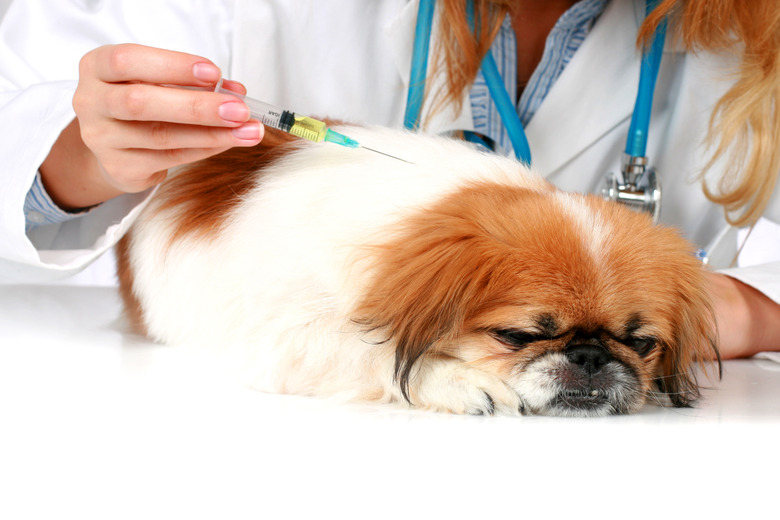What Is The Meaning Of DHLPP Vaccine For Dogs?
Vaccination is an important line of defense against serious canine diseases. According to the Animal Society for the Prevention of Cruelty to Animals (ASPSCA), the DHLPP vaccine protects against distemper, hepatitis, leptospirosis, parainfluenza and parvovirus. Each of these diseases can cause illness, possibly death and are highly contagious. The DHLPP vaccine is administered to puppies at four-week intervals and on a yearly basis to adult dogs. Your veterinarian can recommend whether the DHLPP vaccine, or another combination of vaccines, is right for your dog. Your vet will plan a vaccination schedule that is appropriate for your dog's well-being.
Puppies are Vulnerable
Puppies are Vulnerable
Newborn puppies are especially vulnerable to diseases. Purdue University's research shows that nursing puppies receive antibodies from their mother's milk that fight against serious illness, however that protection decreases as puppies grow older, however, and by the age of 12 to 16 weeks, puppies no longer have these antibodies. Associated Vet Clinic recommends that the first dose of DHLPP is given at 6 to 8 weeks of age. Boosters are given at approximately four-week intervals until the puppy is 16 weeks of age. Adult dogs should receive an annual booster of the DHLPP vaccine.
Distemper: Symptoms and Results of Infection
Distemper: Symptoms and Results of Infection
The American Veterinary Medical Association calls canine distemper a "deadly disease" caused by a contagious virus. Symptoms include fever, runny eyes, vomiting, diarrhea, seizures and paralysis. The AVMA recommends the distemper vaccine for all dogs. This recommendation is satisfied by the administration of the DHLPP vaccine, its booster shots and annual revaccinations.
Hepatitis: Possible Outcomes
Hepatitis: Possible Outcomes
According to St. Martins Veterinary Clinic, dogs and puppies can contract many different diseases, such as hepatitis. Hepatitis can cause liver failure and also attacks the kidneys, eyes and respiratory tract. Dogs that survive hepatitis will remain carriers of the disease and may suffer from blindness as a result of the infection. Symptoms include vomiting, diarrhea and changes in the cornea of the eye.
Risks to People and Pets
Risks to People and Pets
Leptospirosis is a zoonotic disease, according to Purdue University's College of Veterinary Medicine. This means it is transmittable to humans by their pets. Dogs and people often contract leptospirosis through contaminated water. The disease causes fever and muscle weakness, vomiting and possibly kidney or liver failure in dogs.
Respiratory symptoms such as a dry cough and nasal discharge are signs of parainfluenza, reports the AVMA. Nasal discharge and saliva are the means by which the disease is spread. The disease may progress to pneumonia and eventually lead to death if not treated.
Parvovirus is highly contagious. It causes fever, vomiting and bloody diarrhea, which lead to dehydration and possibly death. The AVMA notes that parvovirus is spread through contact with contaminated dogs and surfaces. The parvovirus vaccine is recommended for all dogs.
What's Right For Your Dog?
What's Right For Your Dog?
Your veterinarian will advise you as to whether the DHLPP vaccine, or a different vaccination protocol, is best for your dog. Although the AVMA recommends the distemper and parvovirus vaccines for all canines, the association states that the vaccines for leptospirosis and canine influenza may not be appropriate for every canine. Whichever vaccine protocol you choose, make sure to check with your vet the best way to make sure both you and your furry friend are protected from diseases.
Always check with your veterinarian before changing your pet's diet, medication, or physical activity routines. This information is not a substitute for a vet's opinion.
References
- WebMD: Dog Vaccine Schedule for Puppies and Adult Dogs
- Associated Vet Clinic: Canine Vaccination Protocols
- Animal House Vet: Canine Vaccination Schedule
- ASPCA: Vaccinations
- Purdue University College of Veterinary Medicine: New Puppy's Wellness Visits
- American Veterinary Medical Association: Disease Risks for Dogs
- St. Martins Veterinary Clinic: Dog Diseases
- AVMA: Dog Influenza
